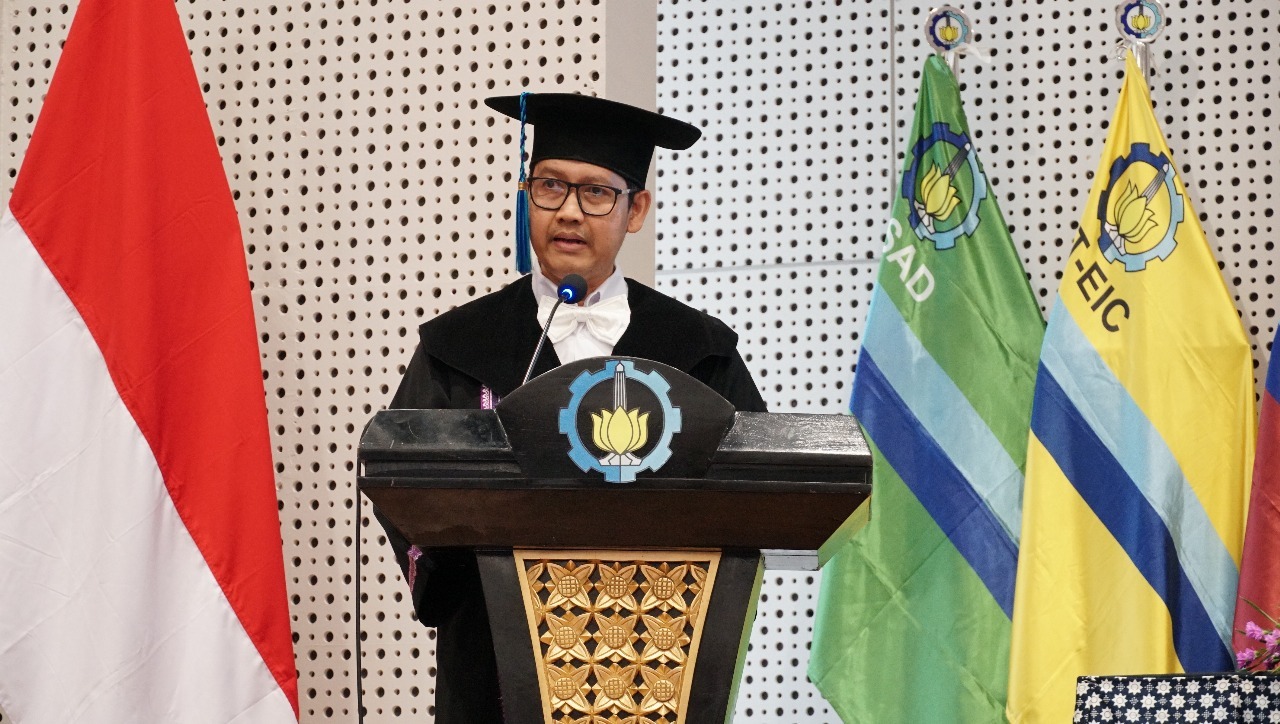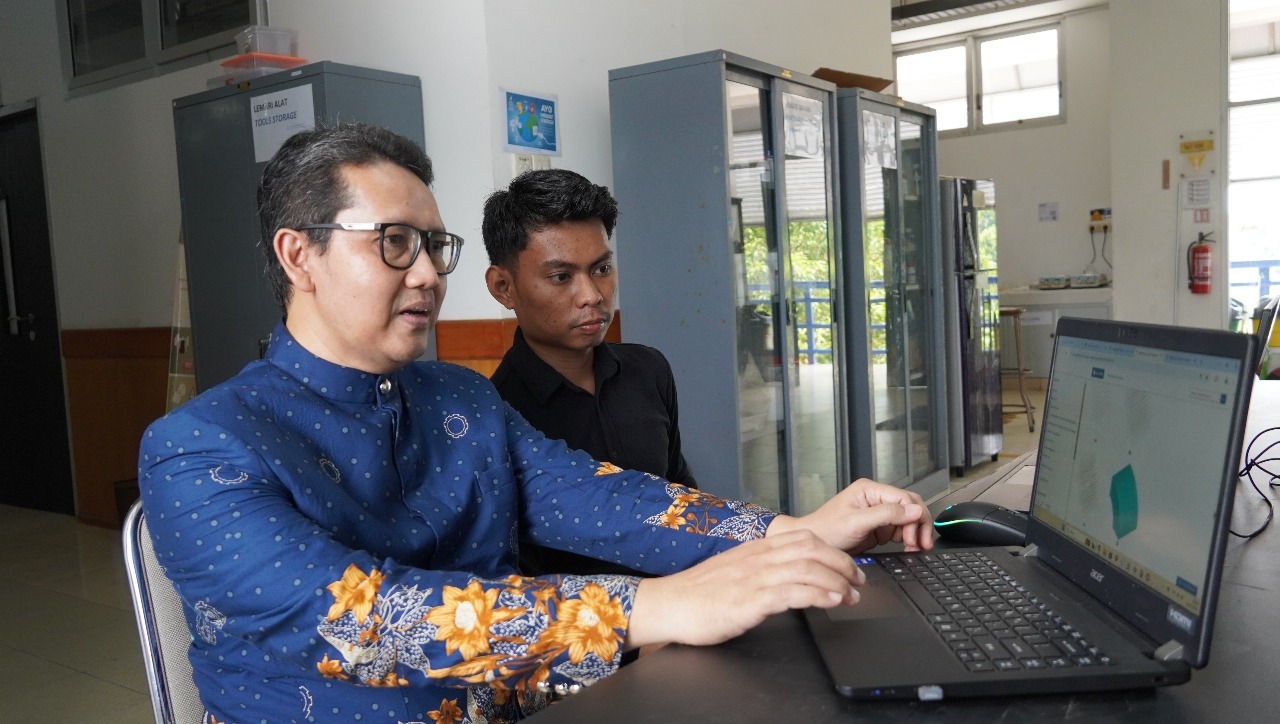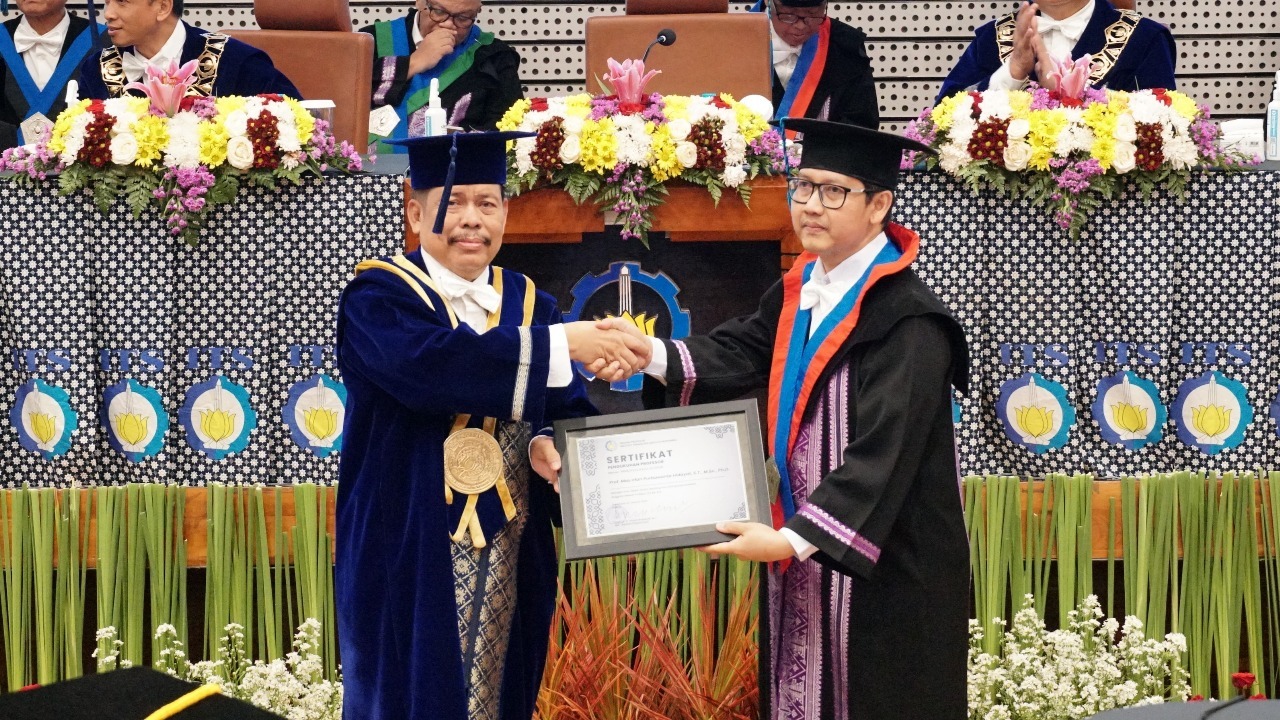ITS Professor Develops Meshless Method for Efficient Material Computation

Prof Mas Irfan Purbawanto Hidayat ST MSc PhD while presenting a scientific oration in the ITS Professors Council Open Session at the ITS Research Center Auditorium
ITS Campus, ITS News — With science’s rapid development and integration in today’s digital era, materials computing has become an essential element in advancing materials engineering. The 214th Professor of Institut Teknologi Sepuluh Nopember (ITS), Prof Mas Irfan Purbawanto Hidayat ST MSc PhD, who was confirmed as a professor in the field of material computing, also responded to these conditions.
In his scientific oration, “The Development and Role of the Material Computing Discipline: from Geometry to AI and from Energy to Green Economy,” this man, who is familiarly called Irfan, explained that his scientific branch is the application of computational techniques in the field of material science and engineering. “The rapidity of computational science offers a new paradigm for the development of materials science and engineering,” he said.
Furthermore, Irfan said that material computing has a dual role in its application. The two crucial roles are predicting unknown material properties and optimizing existing materials. “The importance of these two roles can be explored with the Processing-Structure-Property-Performance (PSPP) relationship or map,” explained the ITS Department of Materials and Metallurgical Engineering professor.
Departing from this role, this master’s and doctoral alumnus from Universiti Teknologi Petronas, Malaysia, brings scientific novelty in a computational domain that can be processed without a mesh (material net) or meshless method. The method allows analysis closer to the characteristics of material particles and presents a more natural modification process without breaking the mesh.

Prof Mas Irfan Purbawanto Hidayat ST MSc PhD while explaining the Meshless Method to postgraduate students (S-2) at the ITS DTMM Material Innovation Laboratory
The advantages of the meshless method include its integration with deep learning, resulting in Physics-Informed Neural Networks (PINN). Material prediction and optimization parameters can be integrated and more efficient in this context. “This integration is called digital engineering, which produces solutions to various science and engineering problems,” said this man, born in Gresik on October 27, 1976.
With various advantages in material computing, Indonesia is getting new ammunition to support the government’s plan to achieve net zero emissions. Irfan said there is still a need to emphasize and focus on this field, especially in Indonesia. “This field plays an important role in integrating workflows for discovery and innovation in exploration, characterization, and material manufacturing processes,” he explained.

Prof Mas Irfan Purbawanto Hidayat ST MSc PhD while receiving the inaugural certificate of the 214th ITS professor
Not only that, but Irfan also emphasized that the development of material computing is in line with the Sustainable Development Goals (SDGs). In particular, this field contributes to SDG 9, namely industry, innovation, and infrastructure, by encouraging innovation in developing more efficient and sustainable materials. In addition, material computing also plays an essential role in achieving SDG 7, which is clean and affordable energy.
Finally, the Head of the Postgraduate Study Program of the Department of Materials and Metallurgical Engineering ITS for the period 2019 – 2024 hopes that the field of material computing will be further deepened. Further development will undoubtedly have a good impact on science and materials engineering in Indonesia. “I hope more researchers and students are interested in exploring this field,” he hoped. (ITS Public Relations)
Reporter: Syahidan Nur Habibie Ash-Shidieq
Translator: Lael Soebakir
Related News
-
ITS Develops Four‑Legged Dog Robot with Sensors and Navigation
ITS Campus, ITS News – Institut Teknologi Sepuluh Nopember (ITS) is further solidifying its role in robotic technology
March 15, 2025 16:03 -
ITS Mathematics Alumnus Creates EEG-Based Brain Research Technology
ITS Campus, ITS News — One of the graduates of the Institut Teknologi Sepuluh Nopember (ITS) has succeeded in
March 15, 2025 16:03 -
ITS Promotes FAST-D Scholarship, Unggul, and Global Excellence Scholarship
ITS Campus, ITS News – Institut Teknologi Sepuluh Nopember (ITS) always shows its commitment in supporting students to develop their best
March 15, 2025 16:03 -
Supporting the Implementation of SPMB 2025, ITS Develops the SENOPATI Platform
ITS Campus, ITS News – Showing its contribution in the field of education, Institut Teknologi Sepuluh Nopember (ITS) has redeveloped a platform
March 15, 2025 16:03
